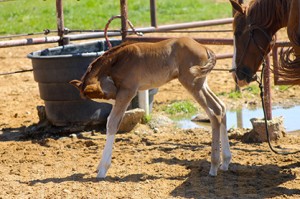NOW is the Time to Start Protecting Your Horses, and Yourself, From West Nile Virus
Kansas State News
MANHATTAN — Start thinking now about protecting yourself and your horse from West Nile virus, says a Kansas State University veterinarian.
Beth Davis, professor and head of the equine medicine and surgery section at the College of Veterinary Medicine’s Veterinary Health Center, says there was an increase in Equine West Nile virus cases in 2013. Summer 2014 is expected to have similar weather patterns to summer 2013, so the risk of infections is just as high.
“We look to species like horses to help give us some insight into how likely humans are to have problems with the virus, but it’s important to recognize that these sort of weather patterns create a high risk for mosquitoes to transmit the disease not only to horses, but also to potentially make humans sick,” Davis said.
West Nile is an encephalitic disease, which means it causes inflammation of the central nervous system, specifically around the brain. It’s a virally induced disease that is transferred to horses and humans through mosquito bites from infected mosquitoes. So far, eight states have reported West Nile virus infections in mosquitoes, birds or veterinary animals. Mississippi has reported one human case. Davis says the peak season for infection is mid to late summer, during the warmer months. That’s why it’s important to start prevention methods now to be protected by July.
West Nile virus is a core vaccine for horses, recommended by the American Association of Equine Practitioners. Four U.S. Department of Agriculture-licensed equine vaccines are available. Initial vaccination requires a series of two to three vaccines, depending on the age of the horse, and is then followed by annual boosters. Vaccine efficacy depends on horse owners working with their veterinarians to establish proper protocols, Davis said.
Another protection tip is to eliminate all sources of standing water, which are breeding grounds for mosquitoes.
“Eliminate things like old tires, boats with tarps on them and rain gutters that may hold water,” Davis said. “Birdbaths are areas where there is going to be standing water, so clean them at least once a week. For other areas that you can’t eliminate standing water, like water troughs for livestock, put mosquito-eating fish in the tanks. Minnows and goldfish will eat any of the eggs that have been laid by mosquitoes and will minimize the mosquito replication.”
The onset of clinical signs for Equine West Nile virus is often sudden, with the progression occurring over the following two to four days.
“Clinical signs of West Nile virus can vary quite a bit in horses,” Davis said. “Mild forms of it may be a fever or a change in attitude for a few days. Most commonly, we do see it progress to where the horse has neurological signs, which could be a quite dramatic change in temperament or behavior. They may have a period where they’re not eating properly or they seem like they’re not quite with it. Also, they may experience changes in the nerves and control function in their head, in things like eye movement and their ability to chew and swallow properly. We may see dramatic changes in their gait, such as stumbling or being uncoordinated.”
If you suspect your horse has been infected with West Nile virus, call a veterinarian immediately. You can contact the Veterinary Health Center at 785-532-5700.











